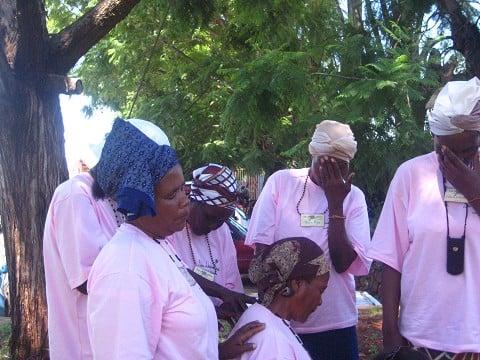

It’s Time For A Women’s Movement in Africa

One reason that Swaziland has had the highest AIDS rate in Africa is that the men abuse the women and get away with it. Often it’s their own family members – how can they respond without hurting them? So, over and over again, women keep the secret of the abuse.
Maria is a good example. One of her sons held her at gunpoint, forcing her off her own homestead, leaving her with no place to go. “What am I supposed to do?” she cried out. Weeping and falling to her knees.
Maria was in a Beauty for Ashes weekend with other Swazi women. The other women came around her in a circle, comforting her through touch and loudly praying together on behalf of her “ashes.” Later that day, at the end of our time together, Maria once again stood before our group. This time it was to communicate the importance of continuing how to love.
Africa is ripe for its own version of the #MeToo movement. J. Lee Grady recently saw that this kind of solidarity is breaking out in other countries. Here’s an excerpt from his article:
So many of the women I met in Tanzania, and in the neighboring country of Malawi, shared painful stories of abuse, harassment, rape and forced marriage.
For the first time, some of them are willing to speak about it publicly.
One brave woman shared how a married man more than twice her age began harassing her. He dangled promises of money to tempt her. She felt intimidated because he held an important position in the government, so she reluctantly gave into his advances.
When she found out she was pregnant, he refused to admit the baby was his—and he took no financial responsibility. The man is an elder in a local congregation.
Several other women told me they were raped as young as 14, and now they care for their children with no help from the men who took advantage of them.
A woman from Arusha, in northern Tanzania, pleaded with me to help the women from the nomadic Masai tribe. She said parents are selling their young daughters to older Masai men just to get the dowry payments.
I hear the stories everywhere I go in Africa, where the abuse of women has many forms: domestic violence, the cruel treatment of widows, forced prostitution, rape by soldiers, the degradation of polygamy, the sexual abuse of housemaids or the horrific practice of female genital mutilation.
At one point during our conference in Tanzania, dozens of women streamed to the front of the auditorium to receive prayer for abuse or abandonment. Two of the women began to scream and writhe on the floor, obviously tormented by demons. Pastor Berrings Mlambya said both women had experienced traumatic sexual abuse, and the man who abused the second woman was deeply involved in witchcraft.
Africa should be ground zero for the #MeToo movement, but women here don’t have the platform to speak out like women in Western nations. Abuse is rampant but African women are expected to protect the status quo. So they suffer quietly. While abuse is discussed openly in the United States, Africa’s crisis remains hidden behind a smokescreen of shame and cultural taboos.
I’m encouraged because I see God breaking through the darkness. In our conference in Tanzania last Saturday night, male pastors from several churches gathered on the platform and knelt in front of the women. Before anyone could say anything, the women begin to wail. They had never seen men humble themselves and apologize for anything, especially sexual abuse.
As Pastor Mlambya prayed in Swahili, repenting on behalf of the husbands, fathers, uncles, boyfriends and bosses who abused these women, a wave of healing flowed through the church.
I expect this miracle to be repeated all across the African continent in my lifetime. As the Holy Spirit brings His freedom, the silence will be broken, and women who have been shrouded in shame will finally make their voices heard.
Yes, it’s time for a women’s movement to break out across Africa. Women are discovering their power and beginning to share the secrets that have kept them trapped. When it happens, it’s a thing of beauty.
———————–
Want to know more or even be a part of the Beauty for Ashes movement? Read more about it here and here.


Yes and Amen. I saw the same thing last year while I was in Zambia last year for Beauty for Ashes. Women pouring their hearts out to each other. They spoke of many atrocities that they had held secret for years. Many women even in their 60’s and 70’s spoke of things they had never told another living soul.
I understand this somewhat as I was raped at 16 by a young man who called himself a Christian. It was my first date ever and I was so excited, but excitement turned to disaster. I was so shocked that I never told another person. How could I have “let” this happen. I held the “secret” for 14 years before it came out in counseling, but it wasn’t until two years ago at a Beauty for Ashes retreat that I was really able to share with other women and know the release of the control shame and guilt had over me. Since then, I’ve been able to share with many women and it has opened doors for them to share their stories.
I shared this story in Zambia and women came to me personally to say this had happened to them. We were able to grieve together and see God’s comfort and redeeming love.
Thanks for sharing this and it is my prayer that many women will come forth and men’s hearts will be pricked to put an end to this abuse in our society.
What an awesome testimony, Becky. Thanks for your courage in sharing.
Here’s a wonderful story of a woman who chose to share about her date rape https://www.youtube.com/watch?time_continue=1259&v=s0NgJ7FQimc – I encourage you and others to watch it.
Thanks for sharing this Seth. Gosh its heartbreaking to hear these stories and know its not just a story, not an hour long drama on TV…its real life for these women and children, and no way to break the cycle. But it reminds me that God can make a way when there is no way..our God is able to move these mountains.
I really hope to be involved in Beauty for Ashes this year! Thanks so much for sharing. I will be in prayer for Swazi (which i have a huge heart for) and all of Africa!!
You’ll be great at helping to lead B4A retreats – I can see you at one!
Thanks for sharing this, Seth.
I look forward to when I can return to Africa and be a part of what I know God is starting to do there. God LOVES African women. I know these women finding their voices and their freedom in Christ will be a powerful catalyst for change for their communities, cultures, and nations…just like God shared with you years ago!
So glad to be a part of B4A 🙂